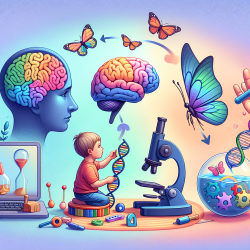Introduction
The COVID-19 pandemic has significantly altered the landscape of education and therapy, particularly for children living in poverty. The research article "Meaningful Activity, Psychosocial Wellbeing, and Poverty During COVID-19: A Longitudinal Study" provides valuable insights into how meaningful activities can impact psychosocial wellbeing. As practitioners, it is crucial to understand these findings and apply them to improve outcomes for children, especially during challenging times.
The Importance of Meaningful Activities
Meaningful activities are defined as those that hold personal, professional, or social significance for individuals. They contribute to a sense of purpose and fulfillment, which are essential for psychosocial wellbeing. The study highlights that engagement in meaningful activities is closely associated with improved mental health outcomes, including reduced anxiety, depression, and loneliness.
Key Findings from the Research
The longitudinal study conducted during the first year of the COVID-19 pandemic revealed several critical insights:
- Engagement in meaningful activities decreased over time, particularly from the second to the third survey period.
- There was a significant correlation between meaningful activity engagement and improved psychosocial wellbeing.
- Participants reported that physical distancing exacerbated exclusion from meaningful activities, particularly for those living in poverty.
- The study emphasized the role of occupational therapists in supporting individuals to engage in meaningful activities, thereby enhancing their psychosocial wellbeing.
Implications for Practitioners
As practitioners, understanding the link between meaningful activities and psychosocial wellbeing is crucial. Here are some strategies to implement these findings in practice:
- Promote Engagement: Encourage children to participate in activities that they find meaningful. This could include arts, music, sports, or any other activity that resonates with them personally.
- Create Accessible Opportunities: Work with schools and communities to create accessible opportunities for children to engage in meaningful activities, especially those from low-income backgrounds.
- Advocate for Policy Change: Advocate for policies that support the inclusion of meaningful activities in educational and therapeutic settings, recognizing their importance for mental health and wellbeing.
- Collaborate with Families: Collaborate with families to identify and facilitate meaningful activities that can be integrated into the child's daily routine.
Encouraging Further Research
While the study provides valuable insights, there is a need for further research to explore the long-term impact of meaningful activities on children's psychosocial wellbeing. Practitioners are encouraged to contribute to this research by sharing their observations and experiences.
Conclusion
The findings from the study underscore the critical role of meaningful activities in enhancing psychosocial wellbeing, particularly for children living in poverty during the COVID-19 pandemic. As practitioners, it is our responsibility to integrate these insights into our practice, advocating for policies and programs that support meaningful engagement for all children.
To read the original research paper, please follow this link: Meaningful Activity, Psychosocial Wellbeing, and Poverty During COVID-19: A Longitudinal Study










